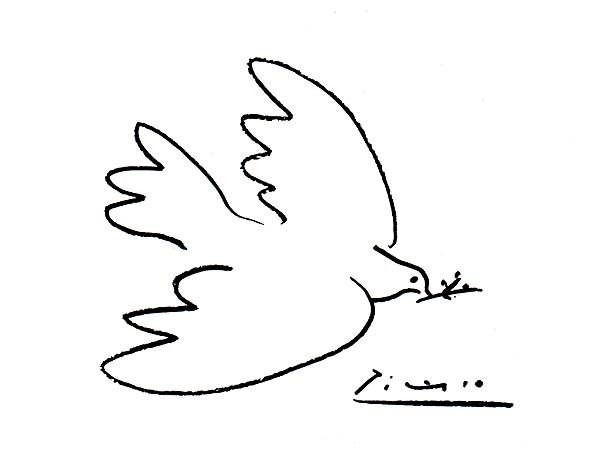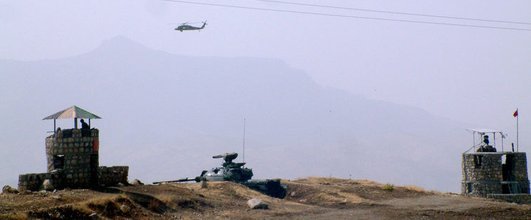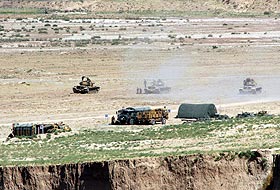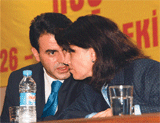Turkey has seen an escalation of violence in recent weeks.
Following the death of thirteen soldiers in the south-eastern province of Sirnak on Sunday (7 October), two more soldiers died yesterday (8 October) in mine explosions in Diyarbakir and Sirnak and three were injured.
Last week, twelve villagers, seven of them village guards, were killed in an attack on a minibus in Sirnak's district of Beytüssebap. The PKK has denied carrying out the attack.
According to data from the General Staff, more than 175 PKK (Kurdish Workers' Party) militants have been killed since April 2007. The number of soldiers who have died in the same period is not clear, but there are regular reports of deaths.
Army, AKP, CHP, MHP: More determination needed
In the light of the latest deaths of soldiers, the ruling Justice and Development Party (AKP) has expressed its determination to fight terrorism, and yesterday President Abdullah Gül, Prime Minister Recep Tayyip Erdogan and Chief of General Staff Yasar Büyükanit met to discuss the situation.
In a joint statement, they said: "We have emphasised the determination for our security forces to continue their justified fight against terrorism, whatever the conditions, and for the application of strict measures."
The second-largest party in parliament, the Republican People's Party (CHP) has accused the AKP of encouraging separatism, and the pro-Kurdish Democratic Society Party (DTP) of trying to legitimise the PKK.
The chair of the Nationalist Movement Party (MHP) has pointed out that cross-border pursuit of terrorists has become commonplace.
In short, the army and the main parties in parliament, however critical they may otherwise be of each other, have united in a discourse of "determination to fight terrorism", and cross-border operations in Northern Iraq are again on the table.
Demirtas: Step back from methods of last 24 years
The DTP and the Freedom and Solidarity Party (ÖDP) have countered with a call for peace.
Selahattin Demirtas, leader of the DTP group in parliament, said yesterday: "We say enough! We are ready to do our duty in a responsible manner to stop the blood from running." The DTP has been attacked both verbally and physically in recent days; the Ankara and Istanbul headquarters were shot at, and stones were thrown at the party building in Adana.
Demirtas reiterated in his statement that the party opposed armed conflict and that arms could not be used to seek rights: "No political aim is more valuable than one drop of blood." He called on parliament to step back from "the methods used for the last 24 years" and to look for ways to produce solutions without blood and without arms.
Uras: Bombs will not achieve peace
ÖDP MP Ufak Uras said, "Those who want peace cannot be credible with guns, mines and bombs and will not achieve anything positive."
He called for the burying of arms, for political and social solutions to the Kurdish question and for a development of a culture of peaceful coexistence:
"Steps taken in Turkey to solve the Kurdish question will come from democratic institutions, the democratic public, parliament and political parties, democratic citizens and a democratic mentality. They will not come from violence and conflict."
The president of the Turkish Human Rights Foundation (TIHV), Yavuz Önen, also condemned violence categorically:
"Opposing the hegemony of violence in a determined manner has become an existential necessity. Let us not give opportunities for violence and conflict to increase the feelings of hatred and the desire for revenge in society."
The Human Rights Association (IHD) also condemned the use of violence for political aims, but also emphasised that a democracy must recognise and protect its citizens' rights. It called for a silencing of guns. For this to happen, so the IHD, the government needed to focus on democratic reforms concerning the Kurdish question.
Miroglu: When there is talk of peace, violence increases
Orhan Miroglu of the DTP spoke to bianet and pointed out that whenever there was talk of peace, an increase in violence followed.
He gave the following examples:
- In the early 90s, President Turgut Özal negotiated with PKK leader Abdullah Öcalan, with today's Iraqi President Celal Talabani acting as an intermediary. Özal had apparently even convinced some high-level generals to stop fighting. Soon after, the Hakkari Gendarmerie Station was attacked. Öcalan told Talabani that the attack had been carried out by groups not controlled by the PKK. Then the General Commander of the Gendarmerie, Esref Bitlis, died in an unsolved plane crash.
- Miroglu also made a connection between the conference "Turkey is Looking for Peace", held in Ankara in January of this year, and the murder of journalist Hrant Dink four days later.
- Again, he argued that the conference on a peace process in Turkey, held in Diyarbakir on 29 and 30 September, was followed by the attack on villagers in a minibus in Sirnak, and, one week later, by the killing of soldiers in Sirnak.
The government and the army, so Miroglu, were not looking for a peaceful solution; rather, their statements have pointed to decades of continuing violence.
Turkish Peace Parliament: Concrete steps
The Turkish Peace Parliament published a report at the beginning of September, a result of deliberations at the above-mentioned conference in January. The report called for concrete steps to be taken to achieve peace and democracy. (TK/AG)


















